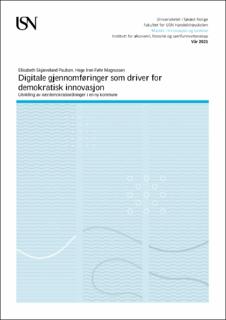| dc.contributor.advisor | Branstad, Are | |
| dc.contributor.author | Magnussen, Hege Iren Føhr | |
| dc.contributor.author | Paulsen, Elisabeth Skjæveland | |
| dc.date.accessioned | 2021-08-25T16:12:24Z | |
| dc.date.available | 2021-08-25T16:12:24Z | |
| dc.date.issued | 2021 | |
| dc.identifier | no.usn:wiseflow:2498293:43214902 | |
| dc.identifier.uri | https://hdl.handle.net/11250/2771252 | |
| dc.description.abstract | Denne avhandlingen handler om styrking og utvikling av lokaldemokratiet i en kommune med vedtak om kommunesammenslåing. Nye Tønsberg kommune har et vedtak om å styrke lokaldemokratiet, motivere til deltagelse og medvirkning. Med formål om å gjøre avstanden mellom innbyggere, administrasjonen og politikerne mindre. Kommunen legger opp til varierte former for innbyggerdialog og nærdemokrati utøvelse. Nye former for demokratiske medvirkningstiltak betegnes som «demokratiske innovasjoner». Innovasjonsbegrepet knytter seg til at det er helt nytt, eller helt nytt for «oss», mens demokratibegrepet i denne sammenhengen knytter seg til at det skal bidra til demokratiske forbedringer eller goder. Vi har sett nærmere på hvordan en kommune via nærdemokratiordningen, la til rette for samskaping av mål og strategier i kommuneplanens samfunnsdel. Ved å bruke kriterier for demokratisk innovasjon jmf. Elstub & Escobar (2017) og Smith (2009) har vi sett på hvordan dette kan brukes som et verktøy til validering og design av demokratiske prosesser. Med bakgrunn i pandemien ble det lagt opp til digitale medvirkningsprosesser.
Vi ser i vår studie nærmere på hvordan institusjonelt designvalg kan understøtte digitalt nærdemokrati, hvilke demokratiske goder utløses, hvordan er det lagt til rette for medvirkning for barn og unge, hva var outcome/resultat fra prosessene og hvordan opplevde deltakeren medvirkningen.
Studien kom fram til følgende hovedfunn:
* Dersom vi ser på alle prosessene som en helhet og som et institusjonelt design for medvirkning til en kommuneplan, utløses flere demokratiske goder. innsikt/innsyn utløses det gode i stor grad i alle metodene. Det innebærer at kommunen legger til rette for aktivt medborgerskap og gir innbyggerne mulighet for å ha innsyn i hele prosessen.
* Videre finner vi i stor grad at designet utløser inkludering når det er målrettet medvirkning med utsatte grupper og barn og unge.
* Det styrkebaserte designvalget legger spesielt til rette for gode demokratiske deliberative dialoger og inkluderende prosesser.
* Designvalget gjør det mulig å gjennomføre digitale demokratiske prosesser som legger til rette for inkludering, folkelig kontroll, deliberative dialoger og innsyn på en effektiv måte.
* 98% av deltakerne i de digitale verkstedene ville deltatt igjen om de ble spurt. | |
| dc.description.abstract | This thesis is about strengthening and developing the local democracy in a municipality with decisions about municipal amalgamation. Embedding democratic innovation in New Tønsberg municipality seeks to increase and deepen citizen participation in the policymaking and political decision-making through the institution Nærdemokratiordningen (Local democracy). Furthermore to narrow the distance between citizens, administration, and politicians. The municipality offers varied forms of dialog and citizen participation. New forms of democratic measures of participation is referred to as democratic innovations. The term innovation refers to something that is completely new or new to us, while democracy in this context refers to the objective of democratic improvements and goods. We have studied how a municipality facilitated co-creation of goals and strategies in the municipal longterm Plan through citizen participation. By using the criteria of democratic innovation cf Elstub & Escobar (2017) and Smith (2009), we have studied how these can be used as tools for validation and design of democratic processes. Due to the ongoing COVID-19 pandemic the municipality developed facilitated digital participation processes. In our study, we take a closer look at how institutional design can support digital local democracy. Which democratic benefits is achieved, how participation are facilitated for children and young people, the outcome of the processes and how the citizens experienced the participation.
The main findings of the study:
* As an institutional design for a municipal plan, all democratic goods are realized. Insight is the good which to a great extent is triggered in all methods. By choosing citizen participation municipalities facilitate an active citizenship and give the inhabitants the opportunity to follow the process as a whole.
* The study also finds that this design to a great extent facilitates the participation of vulnerable groups, children and young people.
* A strengths-based participatory approaches leads to democratic deliberative dialogues and inclusive processes .
* Choice of design facilitates digital democratic processes which makes it possible to create inclusion, popular control, deliberative dialogues and insight in an effective way.
98 % of the participants in the digital workshops responded that they will participate again if asked. | |
| dc.language | nob | |
| dc.publisher | University of South-Eastern Norway | |
| dc.title | Digitale gjennomføringer som driver for demokratisk innovasjon | |
| dc.type | Master thesis | |
